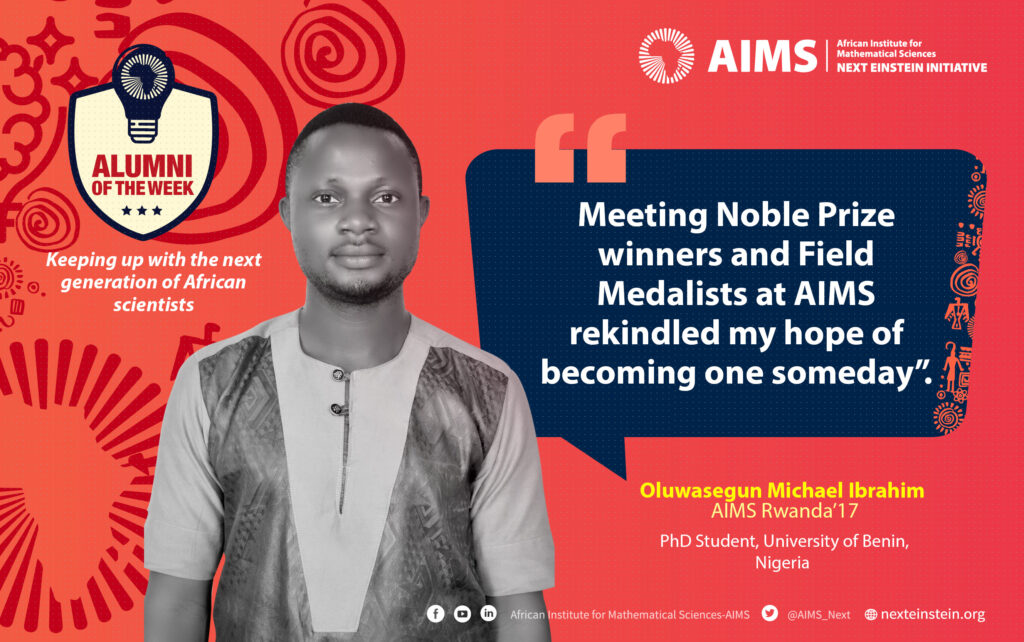In this week’s edition of #AlumoftheWeek, we make a stop in Benin City, Edo State, Nigeria, for a chat with Oluwasegun Michael Ibrahim.
Q: Tell us about yourself and your motivation for choosing AIMS.
Oluwasegun: Before coming to AIMS, I pursued my undergraduate studies at the Adekinle Ajasin University in Nigeria, where I earned a BSc in Industrial Mathematics from 2009 to 2013. I went on to glean an MSc in the same discipline at the University of Benin, Nigeria, in the 2015/2016 academic year, before finally gaining admission into AIMS Rwanda.
I chose AIMS because it enables Africa’s determined and resilient students to flourish as independent problem solvers capable of creating genuine innovations. An ecosystem filled with disciplined and refined intellectuals, where students and lecturers thrive in common spaces within a twenty-four-hour learning environment of highly interactive teaching, where students are encouraged to learn together through questioning and discovery. The emphasis on computational methods and computing with internet access was the closer for me.
Q: How would you describe your time at AIMS?
Oluwasegun: My first ever trip to see a lake was during my studentship while at AIMS Rwanda. It was my first time at Lake Kivu. We had long completed our course and research phases but AIMS still created that opportunity to explore beyond the confines of the academic environment. I was privileged to visit Genocide Park, Kigali. Touching stories that have now led to today’s Rwanda as we know it is something of joy that Afric
a as a continent can imbibe. We are stronger together. Participating in community service, popularly known as Umuganda, was a pleasant experience for me. I was excited to see everyone in Rwanda, including the number one citizen, get involved in the monthly community work.
My favourite experience while at AIMS was the cultural day, where students from different parts of Africa showcase their cultural heritage. I was proud to lead Nigerian students to display our heritage. Stories surrounding each country suggest that Africa is rich in tradition and culture. These memories remain unshaken as I don’t get tired of sharing the experience. My first encounter with a Nobel Prize winner and Field Medalist was an unforgettable moment. Having the opportunity to wine and dine with them was inspiring for me. It rekindled my hope of becoming one someday.
Q: What would you describe as your post-AIMS success story?
Oluwasegun: Since graduating from AIMS, I serve as a Research Assistant at the University of Benin, Nigeria. My research focuses on developing novel numerical methods, particularly hybrid linear multistep methods for the solution of periodic, complex, linear, and non-linear initial value problems in ordinary differential equations. My work has resulted in the following publications:
Ibrahim, O.M., Ikhile, M.N.O.: A Generalized Family of Symmetric Multistep Methods with Minimal Phase-Lag for Initial Value Problems in Ordinary Differential Equations. Mediterranean Journal of Mathematics, 17, 87 (2020). https://doi.org/10.1007/s00009-020-01507-5
Ibrahim, O.M., Ikhile, M.N.O.: Inverse Hybrid Linear Multistep Methods for Solving the Second Order Initial Value Problems in Ordinary Differential Equations. International Journal of Applied and Computational Mathematics, 6, 158 (2020). https://doi.org/10.1007/s40819-020-00910-6
Ibrahim, O.M., Ekundayo, D.D.: COVID-19 Pandemic in Nigeria: Misconception Among Individuals, Impact on Animals and the Role of Mathematical Epidemiologists. Preprints (2020), 2020040492. https://doi.org/10.20944/preprints202004.0492.v2
Q: Which of the SDGs is most important/relevant to you? How do you plan on addressing it in your work?
Oluwasegun: The Quality Education SDG resonates with me.Having gone through world-class training at AIMS, I have always been interested in adopting mathematics to understand the complex interdependencies between socio-economic problems and policy failures and the role of computational social science and systems dynamics for policy formulation. One way to better understand this problem is by modelling this real-life phenomenon into a system of ordinary differential equations and studying the qualitative and quantitative properties of the model to gain further insight.
Currently, I am a Doctoral Candidate at the Applied Mathematics Section, Department of Mathematics, University of Benin, Nigeria. My research focuses on mathematical modelling of the effect of criminal gangs in Nigeria. My involvement with this research is to inform policy formulation and proffer control strategies in crime-fighting and control for policymakers in Nigeria.
Q: Where do you see yourself in the next few years?
Oluwasegun: My ultimate (academic) goal is to become a Professor in Mathematics and work as a lecturer, researcher, and consultant to governmental and non-governmental establishments in Africa. In research, I believe I can utilize my knowledge and creativity by contributing more to the development of science and resulting in uplifting humanity. I have a great strength of character, commitment to purpose, and readiness to stretch myself to propagate the gospel of Pan-Africanism. I believe that acquiring research experiences will continually help me enhance teaching and research, building a culture of realistic mathematics education to be socially valuable in my home country and for Africa.
Q: What is your message to current AIMS students and young people across the continent?
Oluwasegun: AIMS is full of opportunities. You will never know how much you have missed until you have left the campus. So, while you are there, take advantage of the supportive staff, facilities, and the environment. Ask as many questions as possible. You may never have the opportunity of undergoing such flexible academic programming again. Mix-up! Interact! Maths is Fun! You can be the Next Einstein Africa has been waiting for.

